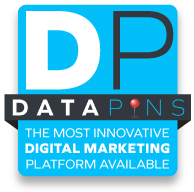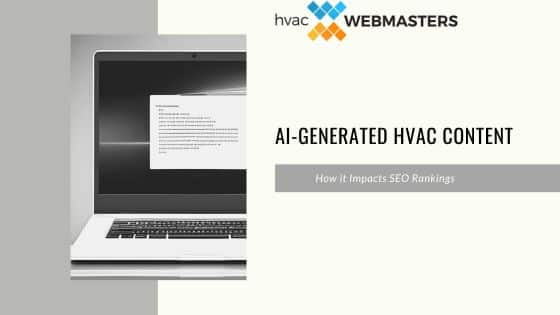
The emergence of AI tools like ChatGPT and Jasper has presented HVAC companies with an essential question regarding their SEO strategy: should we use AI-generated content on our website?
While the age of AI is undoubtedly upon us, the trajectory of this technology and its best use cases remains murky at best. A recent open letter from high-level professionals has called for a 6-month pause on AI advancements as analysts attempt to gain some regulatory hold on this rapidly growing technology.
Unregulated AI advancements, which are currently outpacing Moore’s Law, present threats to businesses, society, and humanity at large. HVAC companies are not immune from these dangers and should consider them before jeopardizing any aspect of their business.
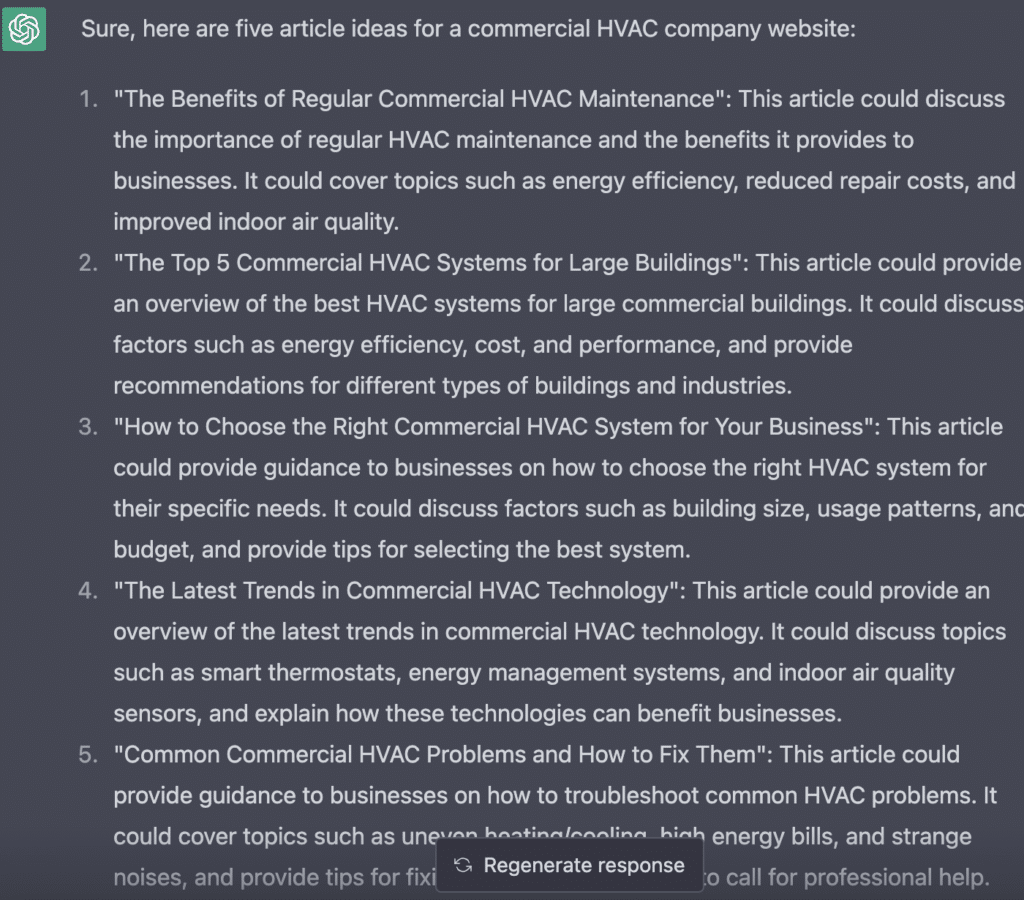
Source: ChatGPT
Publishing AI-Generated HVAC Content for SEO Purposes
Google’s stance on AI-generated content is somewhat vague as they’ve stated that AI content in and of itself does not violate their guidelines but that the mass production of any content, without proper oversight, can be penalized by its algorithms.
If we look more closely at Google’s actions rather than their words, we’ll find they are exploring ways to penalize HVAC content generated for SEO purposes. The August 2022 Helpful Content Update was the first revelation of their general intent regarding AI content.
While the Helpful Content Update language does not explicitly target AI content, it implies that its use is subject to new algorithmic refinements. As a result, relying on AI tools to generate your HVAC website’s content is dangerous at best and reckless at worst.
Can AI-Generated Content Rank on Search Engines?
AI-generated content can rank on search engines for various keywords across all niches. However, multiple studies have concluded that AI-generated content can incur penalties and sudden traffic drops after extended use. Just because something ranks initially does not make it a sound long-term strategy.
The distinction most people miss is that AI content quality varies largely by its initial inputs. Asking ChatGPT to produce an article based on its pre-trained knowledge is not going to produce valuable insights for readers.
However, feeding ChatGPT new and original information for an article can produce something valuable. The concept of originality aligns with Google’s own messaging regarding AI-generated content, which is not about how it is produced but who it is produced for.
If you can use AI to assist you in writing valuable content for humans, it has a good chance of ranking on search results. Unfortunately, most people in the SEO industry are seeking shortcuts and are not going to take the time and effort to feed these tools original and unique data.
As a result, outsourcing your HVAC content generation process to a robot is an unwise business decision and not something any reputation marketing agency would recommend.
If you believe your content writers or marketing agency is currently publishing low-quality AI content, you can run tests with this AI Content Detector tool. It’s important to note, however, that these detectors can produce false positives.
Can Google Detect AI-Generated Content?
With AI detection tools like Open AI Detector and Originality AI available to the public, Google can likely detect AI content on any website. In addition, their AI detection tools are probably more advanced than those currently open to the public and more in line with the pace of OpenAI’s language models like GPT4.
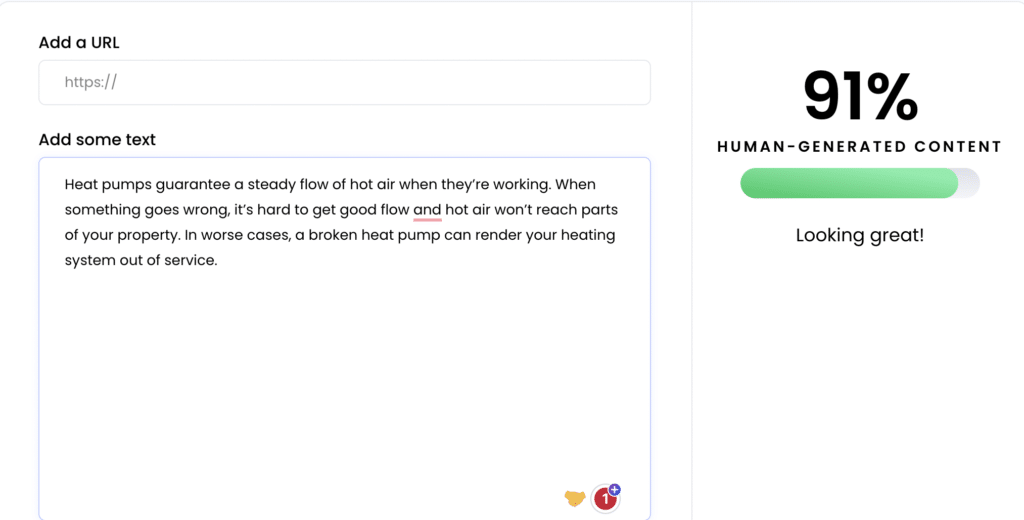
Source: Writer.com
The Impact of AI Chatbots on Bing and Google
Bing’s adoption of ChatGPT into their search engine interface is a bold and potentially industry-shifting move that can help Bing overtake some of Google’s longstanding market share dominance. While the early returns on behavioral shifts in search engine users remain low, it’s enough to be noticeable and cause disruption.
Google is concerned enough to fast-track its own AI chatbot, Bard, to maintain search engine supremacy. However, their counterstrike may not be enough to keep Bing entirely at bay, as early SEO analysis finds Bing’s AI chatbot as a superior tool to Bard.
While the chatbot wars are interesting, their emergence has yet to impact HVAC SEO in any tangible way. For example, users seeking HVAC services are still mainly clicking through to Google Maps listings and top organic listings rather than relying on answers from a chatbot. Furthermore, Bing’s chatbot cites sources for its solutions, ultimately leading users to top-ranking organic results.
Alternative Ways to Use AI to Improve HVAC SEO
While mass-producing HVAC content with OpenAI is foolish, using AI for alternative SEO enhancements should be encouraged. Simply ignoring AI would be as big a mistake as using it recklessly. Below, HVAC Webmasters outlines some of the best use cases for AI.
Brainstorming
GPT can help HVAC companies brainstorm ideas for articles, topics, keywords, titles, and creative projects. Think of ChatGPT as a personal intern who is not to be trusted with high-level business practices but can provide some exciting ideas for new projects.
Summarizing
Are you looking to write an article based on an HVAC-related YouTube video? You can use an AI-powered tool like Summarize Tech to generate a clear video summary. But, again, DO NOT copy and paste the content onto your website. Instead, use it to save time from watching the entire video frame by frame.
Coding
One of the most innovative use cases from ChatGPT and other AI software is bridging the gap between coding and the commoner. You can have ChatGPT create HTML, CSS, and other coding projects on your behalf. Of course, like with content, the software can only be trusted with oversight from an experienced and trained developer.
Still, the ability to fast-track the development of plugins, widgets, apps, and website designs is a significant advantage for HVAC companies.
Image Generation
While much of the focus of AI has been on text-based content, tools like Midjourney, Stable Diffusion, and Canva’s Text to Image app empower HVAC companies to produce unique images for website content.
ChatGPT 4 (the paid version) now offers DALL-E-powered image generation directly inside the ChatGPT platform.
The key to adequately using AI-generated photos is to avoid prompts that include human beings. You should only generate AI images of non-human things like air conditioners, furnaces, etc.
In many cases, AI-generated images are as good or better than royalty-free stock photos. However, the legality of how these images are generated remains up in the air. So, always proceed with caution.
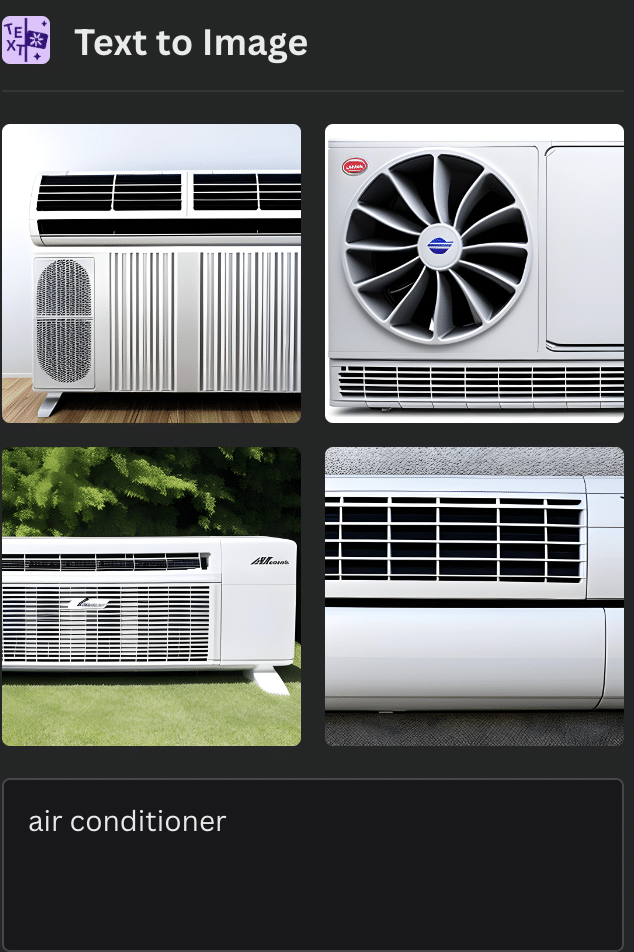
AI Websites
Some tools are now capable of producing AI websites for businesses. While ChatGPT cannot currently produce a website from scratch, other platforms have technology that generates entire business websites. These tools are still in their early stages, so we can expect the quality to improve over time.
ChatGPT can also assist with writing content for your website, writing code for your website theme, and evaluating the conversion rate components of your current design. Because of the speed at which AI is advancing, it won’t be long until ChatGPT can create an entire website.
Final Thoughts on AI and Its Impact on HVAC SEO
As the #1 HVAC SEO company in the world, HVAC Webmasters has a duty to explore emerging trends in our industry. Using AI content on your website is dangerous and may result in an algorithmic penalty that results in a loss of rankings. As a result, our policy is to create original human-generated content on our client’s websites.
While we strongly discourage HVAC companies from using AI software to generate and publish content, we encourage the exploration of AI to help with other areas of your HVAC SEO campaigns. As technology advances and regulations allow us to determine the best use cases, we will continue to find ways to help our clients dominate Google rankings in 2023.

